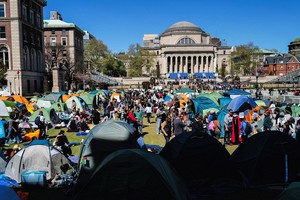Toxic polarization is poisoning America. Here's how you can help stop it this week.

April 17-23, 2023 is the 6th annual National Week of Conversation, where thousands of Americans will join together to help bridge the divide between Americans by having conversations despite differences. To learn more and join an event, click here.
This blog orginally posted on USA Today (Lean Left) and was written by Becca Kearl of Living Room Conversations (Mixed), Cheryl Graeve of the National Institute for Civil Discourse (Center) and Shelly Hoy of Share Our America at The 92nd Street Y.
In the small mountain community of Estes Park, Colorado, residents gather monthly to strengthen their sense of interconnectedness and talk about the issues facing them – from guns and responsibility to homelessness.
”The hope is to build local capacity to engage in difficult issues more collaboratively and productively,” said Denise Lord, executive director for Estes Valley Restorative Justice Center.
The public library, local law enforcement and the Restorative Justice Center have been convening for more than two years to participate in Living Room Conversations. “Folks who might not normally engage with one another come together to learn with and from each other,” Lord said. “There's validation in being able to share your experience and hear about the experiences of others.”
Estes Park is not the only community leaning into connection and understanding. Across the country, the art of conversation is becoming a solution to dissolving the toxic polarization that threatens to rip our country apart.
As individuals, we see and feel it daily as we scroll past headlines, listen to our go-to news outlets and hear from politicians with more extreme views than our own.
We believe that should not, and will not, be our story. Americans have a heritage of – and duty to – opportunity and hope. It’s time we get back to talking to one another, individually and collectively, and the sixth annual National Week of Conversation (Monday through Sunday) is the perfect moment to bring everyone back to the table.
We are being fed a story of division, but that’s not our only story. Americans believe that those with different political affiliations dislike and distrust us two times more than they actually do. And while our trust in government institutions remains devastatingly low, a vast majority of Americans (86%) say we can rebuild our trust in one another.
As professionals who bring people from different backgrounds together – often called “bridging” work – we don't see the polarized extremes day to day. We see hope and optimism.
In our years of work with Living Room Conversations, National Institute for Civil Discourse and Share Our America, we’ve seen superintendents lower the tension between high school students and community police officers, faith leaders foster belonging despite political divisions in their communities, and concerned citizens work together to transform their neighborhoods into inclusive spaces for everyone.
These rapidly growing efforts cross sectors, party affiliations and personal backgrounds, with the goal to instill stronger and more sustainable social norms around how we communicate and collaborate across these differences.
This work happens in our backyards, living rooms, libraries, schools and community centers – all the way up to the highest levels of government.
For example, in Memphis, Tennessee, community development and engagement strategist Tanja Mitchell recently hosted a series of conversations with Share Our America that brought together dozens of Memphians – government and nonprofit workers, real estate developers, formerly incarcerated adults and youth – to share their stories of how crime has affected them personally and their hope for the city's future.
"I saw people open up when they had a safe space for these conversations – they were authentic and human with each other despite the challenging topics and different perspectives," Mitchell said. "These conversations are where real change can begin, and this was just the beginning."
Just as these local efforts invite any and all to participate, the National Week of Conversation, hosted by hundreds of organizations in the Listen First Coalition, offers the opportunity for all Americans to feel seen and heard.
In recent years, the Rev. Jerad Morey of the Minnesota Council of Churches has gathered more than 3,000 people to engage with each other on challenging issues with the help of the National Institute for Civil Discourse.
He sees power and optimism in these kinds of respectful conversations. “To my eyes, participation in the National Week of Conversation is an act of faith and hope," Morey said. "I am living out my core beliefs when I strengthen my own ability to be a blessed peacemaker."
Whether at a family dinner, consuming social media or engaging in your community, you will come across opinions and statements that run contrary to your own opinions and experiences. We can move from a place of opposition to a place of shared humanity by centering personal experiences in the conversation.
Here are a few tips you can carry with you into any conversation, especially when you engage with someone across differences:
►Listen with curiosity for understanding.
►Speak from your own authentic experience with humility.
►Connect to others with respect.
The next time your uncle or niece launches into a defense of their position on a particular issue you disagree with, here are a few questions to help you listen and understand:
►Where have you seen that in your life?
►Can I share an experience I’ve had around this?
►Thank you for sharing that article. Which part really resonated with you?
As one participant in Estes Park said, “Learning from one another is how we move forward in a positive, more compassionate world.”
This week, you have the opportunity to add your voice to the national conversation, meet people across the country to build relationships, and engage in ways that are rooted in trust and respect. Here's how you can join us.
Becca Kearl is executive director of Living Room Conversations and a co-creator of the National Week of Conversation. Cheryl Graeve is national organizer at the National Institute for Civil Discourse and a co-creator of the National Week of Conversation. Shelley Hoy leads Share Our America, an initiative of the Belfer Center for Innovation & Social Impact at The 92nd Street Y, New York, and is a co-creator of the National Week of Conversation.

April 25th, 2024

April 25th, 2024


April 24th, 2024